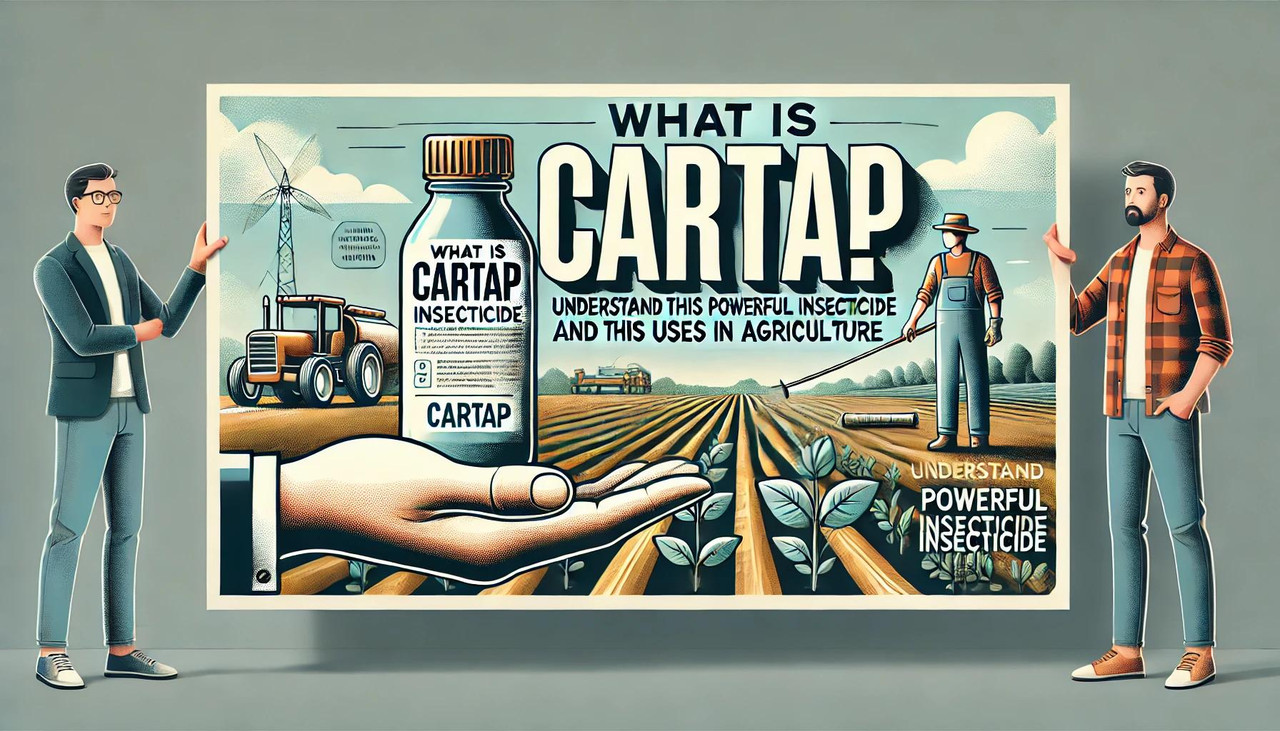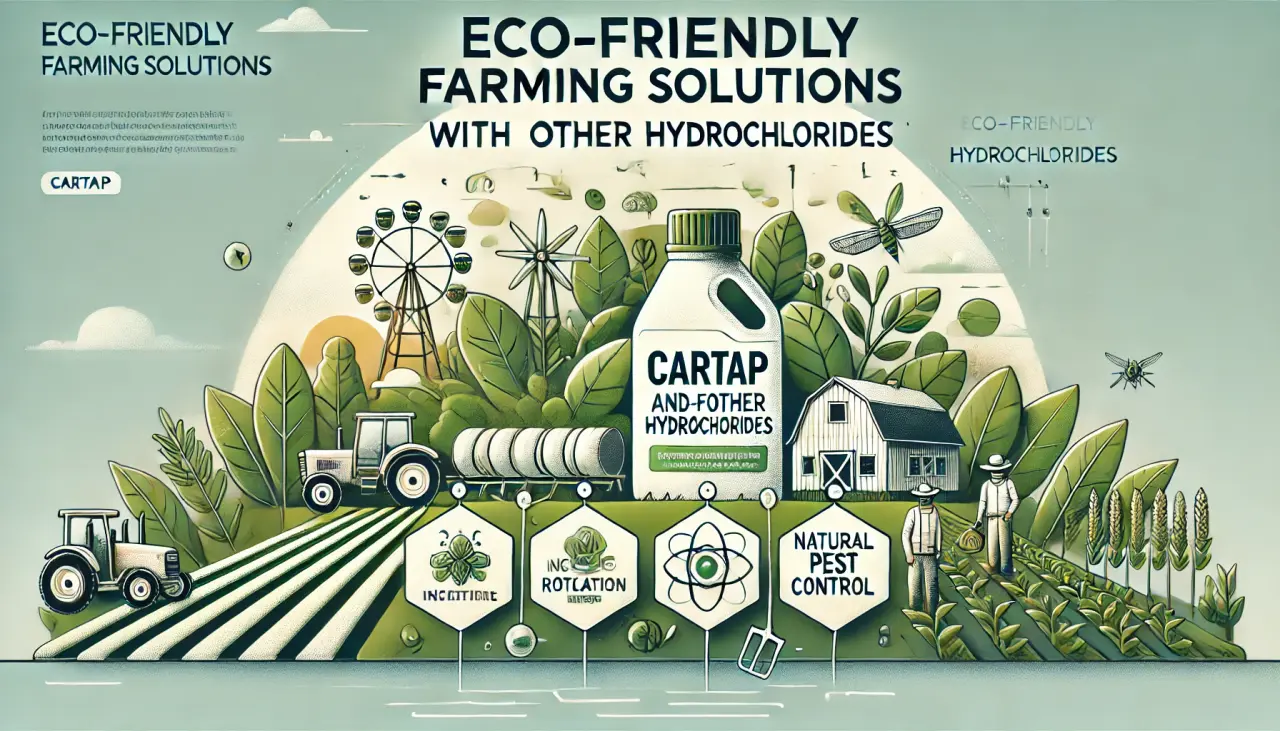
In modern agriculture, cartap, a potent insecticide, is often employed to keep pests away from crops. As a member of the nereistoxin analog group, cartap offers broad-spectrum control against a range of insects, making it a helpful tool for farmers searching for effective pest management options. This article looks into Cartap, how it works, and how important it is for increasing agricultural yields.
What is Cartap?
Cartap, scientifically known as Cartap Hydrochloride, is a white, crystalline insecticide with water-soluble properties. It was developed to tackle persistent pest issues threatening agricultural productivity, particularly in crops like rice, vegetables, and sugarcane. Cartap’s ability to combat major pests while reducing the chances of resistance development has made it an essential component of many integrated pest management (IPM) programs.
How Does Cartap Work?
Cartap attacks the nerve systems of insects, paralyzing them and ultimately killing them. It selectively disrupts nerve transmission, making it extremely effective against pests that prey on crops. By ensuring the quick eradication of harmful pests, this operating approach enhances crop protection.
Key Benefits of Using Cartap
- Broad-Spectrum Efficacy: Cartap controls a wide range of chewing and sucking pests, including stem borers, leaf folders, and caterpillars. This versatility makes it a go-to insecticide for many crops.
- Reduced Resistance Development: Its unique mode of action helps mitigate the development of pest resistance, mainly when used in a rotation plan with other insecticides.
- Cost-Effective Pest Control: Cartap’s long-lasting residual activity means fewer applications are required, translating into cost savings for farmers.
Common Uses of Cartap in Agriculture
Cartap is primarily used to control pests that attack major staple crops. Here are some of its primary applications:
Rice Protection
Leaf filers and rice stem borers are among the pests that can affect rice, one of the most important food crops in the world. Cartap offers effective protection from these threats, ensuring strong crop development and plentiful yields. Cartap reduces crop losses and increases rice output by focusing on these pests at different stages of growth.
Vegetable Crops
Cartap is also used to protect various vegetable crops from harmful insects. Its broad-spectrum control provides essential protection against caterpillars, beetles, and other pests that can devastate vegetable production. Cartap’s low toxicity to mammals and non-target organisms makes it a safer choice for farmers.
Sugarcane and Other Cash Crops
When it comes to cash crops like sugarcane, pest infestations can significantly reduce productivity and profitability. By including Cartap into their pest management strategies, farmers may increase output and protect their valuable crops.
Application Guidelines for Cartap
To get the most out of Cartap, you must adhere to the application guidelines. This ensures optimal pest control and reduces the likelihood of resistance development. Here are some crucial recommendations:
- Accurate Dosage: Always adhere to the recommended dosage to avoid crop damage and ensure effective pest control.
- Application Timing: Cartap’s efficacy is maximized when applied at the right stage of pest development. Early treatment often yields the best results.
- Use in Rotation: Integrating Cartap into a rotation plan with other insecticides helps prevent resistance and prolongs its efficacy.
Cartap in Integrated Pest Management (IPM)
Integrated pest management, or IPM, is a holistic approach that combines several pest control methods to lessen environmental impact and enhance sustainability. Cartap is a suitable choice for IPM efforts because of its selectivity and compatibility with other chemical, biological, and cultural control methods.
Benefits of Cartap in IPM
- Reduced Environmental Impact: Cartap’s low toxicity profile makes it a safer option for the environment and non-target organisms.
- Selective Pest Control targets harmful pests, allowing beneficial insects to thrive and contributing to natural pest suppression.
- Resistance Management: Its unique mode of action delays the development of resistance, making it a sustainable solution for long-term pest control.
Eco-Friendly Farming Solutions with Cartap and Other Hydrochlorides

The growing demand for eco-friendly and sustainable farming practices has led to adoption of insecticides like Cartap, which offer powerful pest control with minimal environmental impact. To further support organic and sustainable farming, consider cruzep 50, cartop hydrochloride 50% SP. This fungicide provides reliable control of fungal diseases, complementing Cartap’s pest control capabilities for a holistic crop protection strategy.
Real-World Examples of Cartap’s Impact
Farmers all throughout the world have seen measurable results from the use of Cartap in crop protection programs. For instance, rice farmers with severe stem borer pest infestations reported significant pest population declines following the use of Cartap, leading to healthier crops and higher yields. These successes demonstrate the need of reliable insecticides like Cartap in maintaining food security.
Considerations for Using Cartap Safely
Although Cartap is highly effective, it is vital to use it responsibly to ensure human and environmental safety. Here are a few key considerations:
- Personal Safety: Use protective clothing, gloves, and masks when handling and applying Cartap to prevent skin contact and inhalation.
- Buffer Zones: Maintain buffer zones around water bodies to prevent accidental runoff.
- Proper Storage and Disposal: To prevent contamination, safely store the Cartap away from children and animals and follow disposal guidelines.
The Future of Pest Management with Cartap
Cartap is a symbol of the advancement and creativity that have revolutionized agricultural pest management. Products like Cartap will continue to be useful and relevant as pests change and new difficulties arise thanks to ongoing research and development.
Cartap’s effectiveness, broad-spectrum control, and adherence to sustainable farming practices make it a crucial part of modern crop protection. Farmers that use Cartap responsibly and use it into comprehensive pest management regimens can preserve crops, increase yields, and ensure long-term agricultural sustainability. Products like Cartap Hydrochloride pave the way for a healthier, more productive farming future.
Read latest article: https://anotherlitttlething.onlineinfatuation.com/
